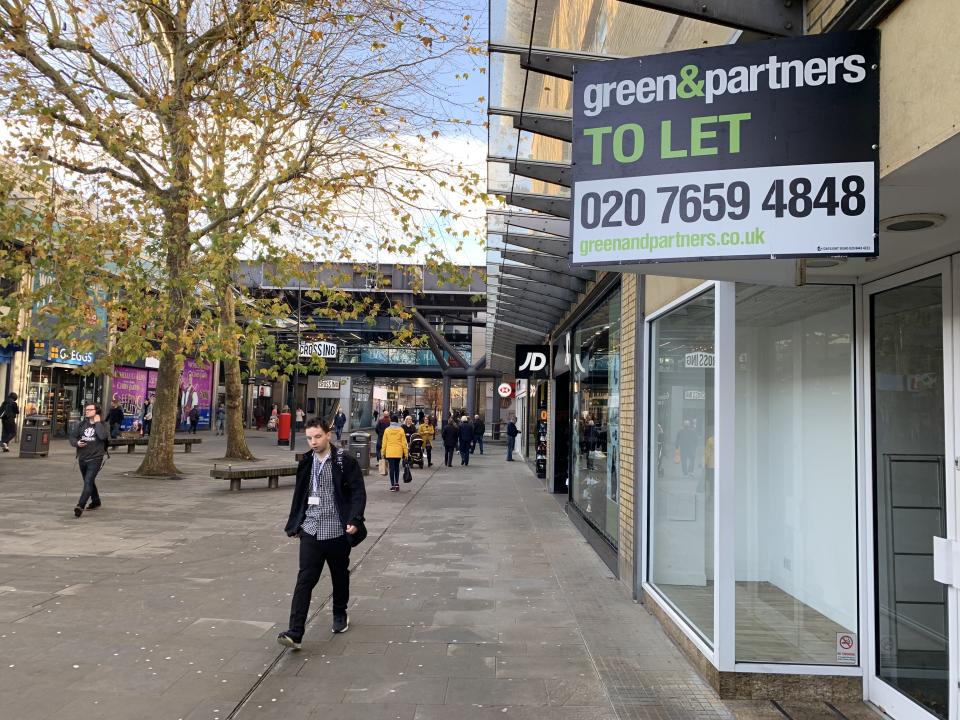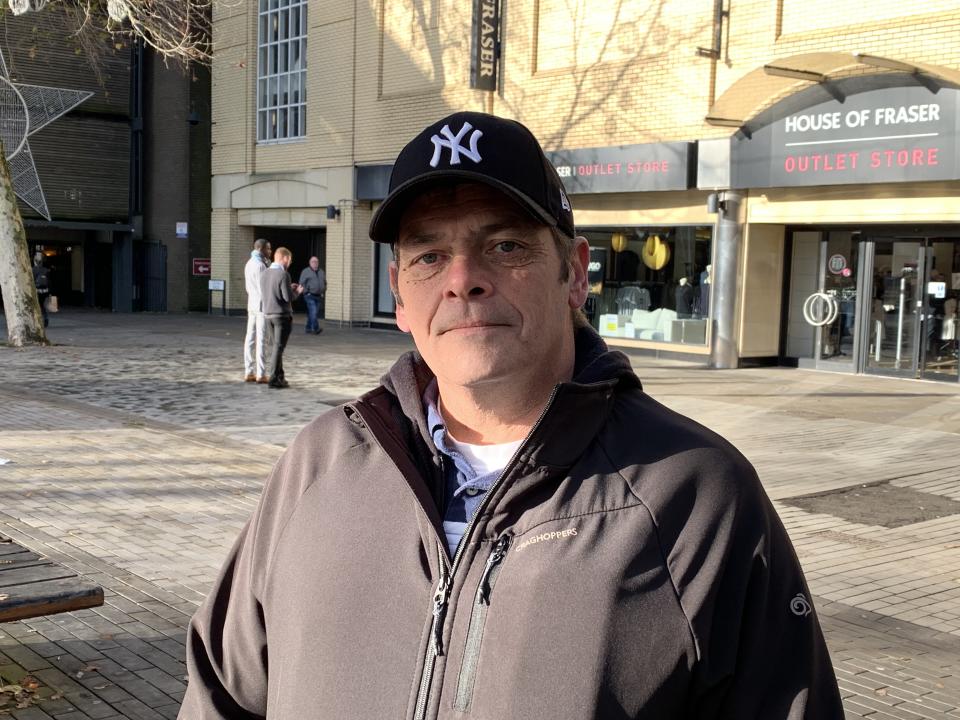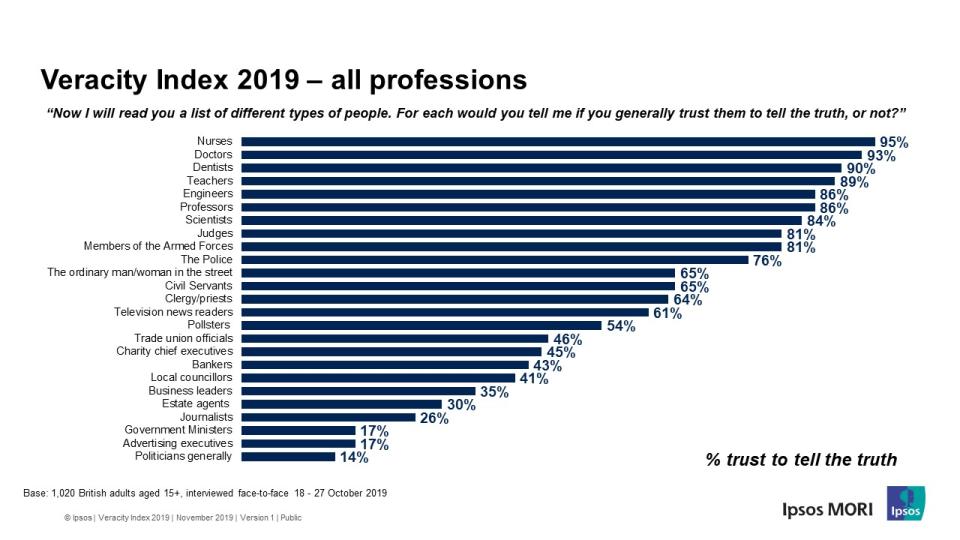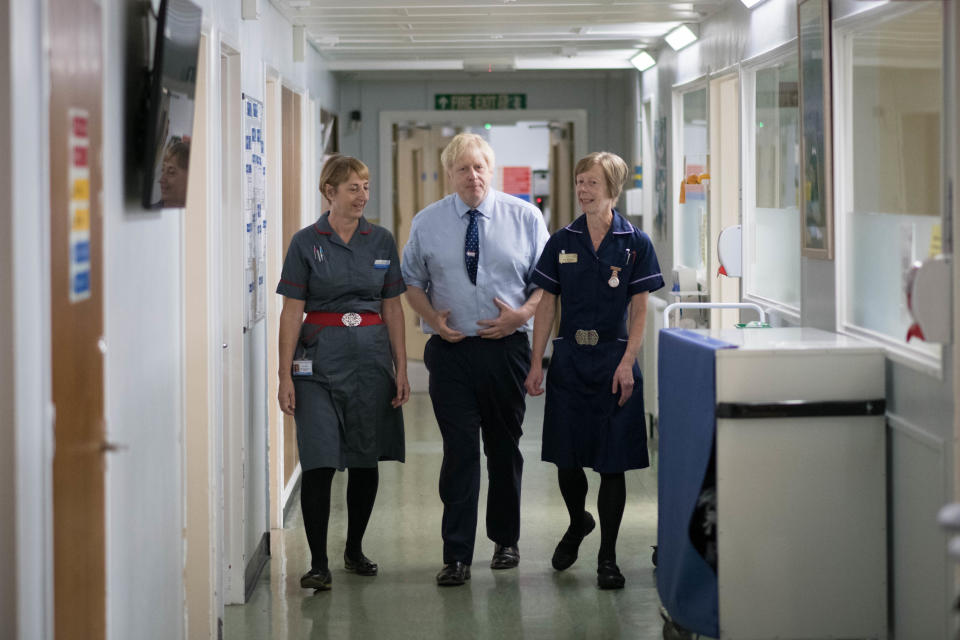Trust sinks in politicians as Brexit chaos and election promises fuel voter despair

“Being a Leave person, I feel betrayed. I don’t trust the Tories. I’ve always been a Labour voter, but can’t trust them no more. Liberal un-Democrats — well there you go.”
Distrust and despair are not hard to find among voters on the streets of Swindon town centre in south-west England, a key election battleground Labour hope to wrestle from the Conservatives.
A recent Ipsos Mori poll shows confidence in politicians has sunk even lower over the past year, falling behind advertising executives to become the least trusted profession in the survey.
Britain heads to the polls soon in a contest dubbed the ‘Brexit election’ and dominated by wide-ranging spending promises, with the main party leaders promising radical change.
READ MORE: The UK crisis no-one is talking about this election
But candidates across parties admit their alarm at levels of discontent among voters in Swindon.
It was dubbed ‘the most average town in Britain’ a decade ago, as data showed it reflected the country as a whole on everything from attitudes to earnings. The marginal South Swindon seat also nearly mirrored the nation in voting just under 52% for Leave in 2016.
If local feeling is any guide to the wider public mood, it suggests rebuilding faith in politics itself should be high up the next government’s in-tray.
Most voters interviewed by Yahoo Finance UK had little faith not only in politicians, but even in the ability of politics to influence their lives, public services or the economy.
Even voters deeply concerned about major issues, from NHS pressures to low pay to the fate of town centres and factories, did not trust or even see politics as one way to help solve them.
Distrust on both sides of the Brexit divide

Britain’s years of political turmoil over Brexit appear to have corroded already low levels of trust among Remainers and Leavers alike. Voters on both sides told Yahoo Finance UK the paralysis meant other countries were “laughing” at Britain.
Brian Payne, 51, the lifelong Labour voter who said he could not trust the main parties to deliver Brexit, said: “If Jeremy Corbyn were stood in front of me now, I’d say ‘how do I explain democracy to my children or grandchildren?’
“Once upon a time it was ever so easy-you had three people in a room, two went yes, one went no and we all went with yes.”
The forklift instructor said he would have voted for the Brexit party, but it withdrew to help the Conservatives, who are fighting to keep a slim 2,464-vote majority.
READ MORE: Lib Dems struggle to break through even in Britain’s most Remain heartlands
Payne said he did not like Boris Johnson but had to “respect for him ‘jeeing up’ the nation,” and even compared him to Winston Churchill. “I’ll probably vote Conservative. I’ve never voted Conservative and it upsets me to say that, but I’ve been majorly let down as a Brexiteer.”
He also blamed Brexit “scaremongering” for denting his trust in the media, and he said he increasingly used social media to find the “other side of the argument.”
On the other side of the divide, Kev Salter, a complaints handler at a bank, said he would vote Labour to secure another referendum, but sounded pessimistic. “Whether that actually happens, I don’t know. Johnson’s a clown, but I don’t even necessarily believe the things Corbyn’s saying are going to happen.
Salter was also one of several voters to highlight bitter and ongoing family divisions, three years on from the referendum. “The majority of my family voted leave, and it’s caused tensions. It’s awful.”
‘The normal waffle from politicians isn’t cutting it’

One of the most striking moments of ITV’s election debate last month was a ripple of laughter as an audience member asked the prime minister how important it was for powerful figures to tell the truth.
Stan Pajak, the Lib Dems’ candidate in the marginal South Swindon seat, said confidence in politicians had come up more than anything else bar Brexit on the doorstep.
“Trust seems to be paramount right now, after two-and-a-half years getting nowhere. There’s a lot of people just unhappy with the whole process,” he said.
Sarah Church, Labour’s candidate who finished a close second in 2017, also said trust “comes up loads.”
She said integrity, honesty and a reputation for it had been crucial in her previous job as an army officer. But she said: “I’ve come into this new sphere, and I’m blown away by the fact people don’t trust me.”
“The normal waffle from politicians isn’t cutting it,” Church added, suggesting voters preferred honesty from politicians where they disagreed to efforts to please them.
But a spokesman for Conservative candidate Robert Buckland, MP since 2010, said he had experienced “the opposite,” with voters “very supportive.”
Voters ‘believe it when they see it’ on spending pledges
Surveys show voters do care deeply about other issues that parties have pledged to tackle beyond Brexit this election. Some in Swindon highlighted their anger over NHS pressures, the closure of local libraries and children’s centres and levels of immigration.
One nurse leaving her shift at a health centre in Swindon said conditions had got tougher and funding tighter in recent years, despite staff doing their best with “the little resources we’ve got.”
Shaun Carroll, a retired ex-line worker at the town’s giant Honda factory, joked that he spent more time using the NHS than at home, but said it was a “nightmare” trying to get GP appointments.
Pledges by party leaders to raise NHS spending might be expected to resonate with such voters, but had failed to cut through.

“I’ll believe it when I see it,” scoffed Carroll, while the nurse said: “I’m really listening to what they say, but I find it hard to believe.”
Several criticised the Conservatives’ promise of 50,000 more nurses, which included retaining existing 18,500 staff.
Pajak said voters felt they were hearing “empty promises,” though the Lib Dem pointed the finger particularly at rival parties. “It’s a forest of money trees from Labour and a very plump money tree from the Conservatives.”
How politics could help town centres and jobs
Politicians have a further battle to convince voters that economic issues in particular can be tackled through political action at all, let alone that they should be trusted to do so.
Several voters expressed frustration at the number of empty shops and the appearance of Swindon town centre, saying it felt like the town had got “worse.”
“It’s a nice place to be, but it’s all going downhill because all the shops are closing,” said Carroll.
A similar gloom over high streets has been reported across Britain, as first out-of-town parks and then online shopping have battered bricks-and-mortar stores.
Major and repeated store closures are sometimes keenly felt as a sign of something deeper about a town’s decline, fuelling an intangible but still significant sense of loss.
READ MORE: What the election could mean for jobs
One voter also said she was embarrassed Swindon has been called not just the most average but ‘the ugliest town in England.’ Much of it was built in the post-war era as an ‘overspill’ area for London.
Such views are particularly striking in a town like Swindon. It is still full of major brands, has a fast-growing economy and was voted 7th best ‘city’ to live and work last year, despite pockets of serious deprivation and high-profile store closures.
Few voters saw politics as relevant to such issues, which suggests political messages are not cutting through.
Many retailers are struggling, but ideas abound for alternative ways politicians could help restore town centres, from encouraging leisure, offices and housing to lower business rates.
Buckland said the Conservatives “can and will regenerate the town centre,” and the government recently promised £25m to help the local council’s regeneration efforts.
Labour and the Conservatives have also promised to raise the minimum wage including lower youth rates, helping retail workers like Ryan King, a sales assistant at one local shop.
The 17-year-old said he earnt just over £5 an hour, despite doing “the same job as everyone else” paid higher rates. But he said he had not heard about their plans, and “distanced himself” from politics as he knew little about it.
READ MORE: Main parties’ plans to fix the housing crisis
Some local politicians think the big challenge could be getting people to vote, but many residents told Yahoo Finance UK they would, despite their scepticism.
One Honda worker said he’d vote for the first time hoping to help save his factory from closure, while even a man who thought all MPs “line their pockets” and normally didn’t vote said he’d cast his ballot for Johnson.
That should give politicians in Swindon and elsewhere some hope it is worth the long, painstaking task of trying to rebuild public trust.

 Yahoo Finance
Yahoo Finance 